The Justice & The Alderman: The Ethical Conundrum Of A Longtime Illinois Power Couple
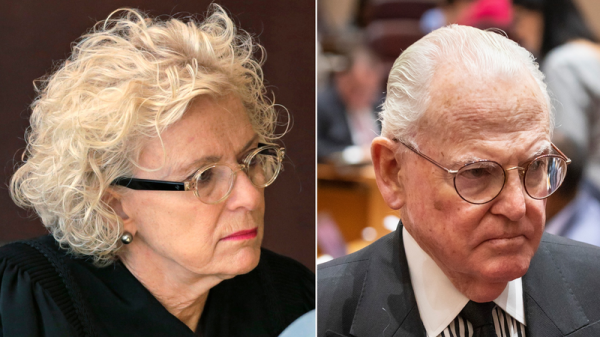
Illinois Supreme Court Justice Anne M. Burke (left) listens to arguments at the Michael A. Bilandic Building in Chicago on Sept 10, 2013. Chciago Ald. Edward Burke (right) at a Sept. 18, 2019, City Council meeting. M. Spencer Green/AP and Manuel Martinez/WBEZ
When Des Plaines residents Debra Sloan and Eugene Zielinski sued Commonwealth Edison, they wanted to force the utility to be more responsive to them when the power went out and endangered their disabled son.
Jason Sloan has a rare disease that leaves him without the impulse to breathe. He has pacemakers in both lungs and his heart, and, at 42, still lives with his parents. Around the clock, Jason depends on a ventilator to live and on a reliable supply of electricity to power it.
Debra Sloan was part of a class-action lawsuit against ComEd involving storm-related power outages from 2007. In some places, the interruptions lasted nearly a week. But once the case reached the Illinois Supreme Court four years later, it fizzled.
The utility persuaded Illinois Supreme Court Justice Anne Burke and the court's six other justices to rule that the court lacked jurisdiction to wade into the matter, dealing a fatal blow to the case.
At the same time that Burke joined the court's unanimous opinion, her husband, powerful Chicago Ald. Edward Burke, 14th Ward, was making money from the utility as his private law firm handled its property tax appeals, city records show.
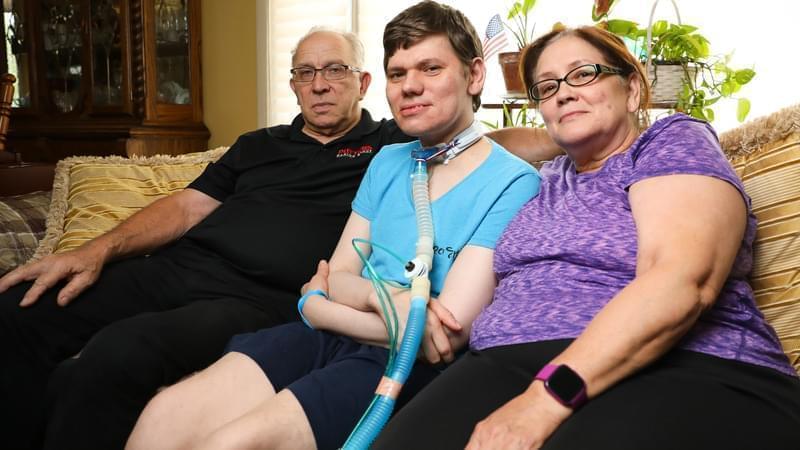
Jason Sloan (center) poses for a photo with his parents, Debra Sloan and Eugene Zielinski, at their Des Plaines home. Jason Sloan has a rare disease that leaves him without the impulse to breathe.
That wasn't the only time that Illinois' top political power couple had been part of such a triangulated relationship: Ald. Burke represents a private property tax client, while at the same time that client is arguing a case before the state's highest court with Justice Burke sitting in judgment.
Since Justice Burke joined the Supreme Court in 2006, a WBEZ analysis has identified 10 cases in which she participated at the same time her husband's firm was being paid by parties in those cases to cut their property tax burdens. Those entities included banks, a big Chicago landlord, a suburban shopping mall, a prominent downtown hospital and ComEd.
There's no evidence to suggest that Anne Burke, who is about to become the state's highest-ranking judge, deliberately swung cases to benefit her husband's clients. But one thing is indisputable: Some of the Supreme Court decisions Justice Burke helped shape spared some of her husband's clients from significant financial and legal risk.
And there is nothing in the public record to shed light on why she participated in those cases yet recused herself from others, highlighting what some legal experts say is a core problem with Illinois' self-policing judicial ethics system. Chicago's top ethics and corruption watchdog likened it to a "windowless room" with little or no transparency.
In their respective city and state financial disclosures, the Burkes have cited financial relationships with Klafter & Burke, the boutique downtown law firm that the alderman helped found more than four decades ago. Shortly before he was named in a 14-count federal racketeering and bribery indictment last May, Burke disassociated himself from the firm.
Federal investigators said the alderman attempted to steer business to the firm from individuals and companies that had business pending at City Hall. The firm has not been accused of wrongdoing.
But those filings do not make clear how much money the Burkes may have made off Klafter & Burke clients while those same clients had cases pending before Anne Burke and the state Supreme Court. It's also unclear whether any of her husband's income from those clients may have filtered into her personal finances as she sat in judgment of those clients' legal disputes.
Justice Burke, who last year overwhelmingly won another 10-year term on the court, declined multiple interview requests from WBEZ. Likewise, her husband did not return a message left at his ward office, and a query to Burke's former law firm went unanswered.
This month, Anne Burke was appointed by the court to serve as its chief justice for the next three years, beginning Oct. 26.
On the day she first was sworn in as a justice in 2006, Burke pledged to be mindful of potential conflicts of interest that might involve her politics or her husband.
"I'm constantly on the lookout for any possible — what appears to be, which I might not even think is an appearance of — impropriety or conflict. I go the opposite way," she said.
And the alderman was interviewed that day, addressing the same question.
"The court always has a way of dealing with potential conflicts, and it happens frequently in litigation, but there's a manner to deal with that, I'm sure that any potential conflicts will, of course, be avoided."
In the case involving Jason Sloan, a court spokesman said Justice Burke was unaware that her husband had any financial relationship to ComEd.
"I can confirm on the record that Justice Burke did not know who was or was not a client of Klafter & Burke in 2011 and still does not know who may or may not be a client of Klafter & Burke to this day," court spokesman Christopher Bonjean said in a statement.
Court rules dictate that judges shall "make a reasonable effort to keep informed about the personal economic interests of the judge's spouse."
Through the court spokesman, Justice Burke declined to comment when asked what standard she uses when deciding whether to participate in a case or why, in the first place, she waded into cases involving her husband's clients.
Scholar: "Something smells a bit fishy"
On the state high court, Burke has gotten high marks from bar-rating agencies, and legal experts say no existing court rule explicitly dictates that she needs to disqualify herself when her husband's clients come before the court on matters unrelated to Klafter & Burke's representation of them.
But even if there's no clear-cut breach of judicial rules, some legal experts interviewed by WBEZ believe Burke's participation in cases involving her husband's clients warrants further scrutiny. It also creates an obvious perception problem worsened by the federal charges against the alderman for allegedly abusing his public power on Chicago's City Council to drum up business for his one-time private law firm, some said.
"No one thing honestly strikes me as being the smoking gun that leads you to say, 'Aha, here's the wrongdoing," said Charles Gardner Geyh, an Indiana University law professor and one of the nation's pre-eminent scholars on legal ethics.
"But collectively, something smells a bit fishy," he said.
ComEd has been one of Klafter & Burke's biggest clients. Since 2009, the firm helped the utility win nearly $4.3 million in property tax refunds in Cook County, records show. Only one other Burke client, AT&T, had more in refunds.
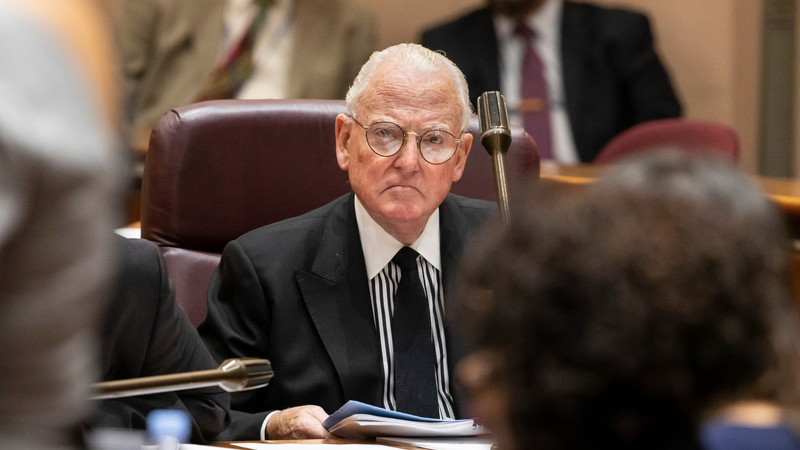
Ald. Ed Burke, 14th Ward, at a Sept. 18, 2019, City Council meeting in Chicago. Burke's private law firm, Klafter & Burke, handles property tax appeals.
Besides the case involving Debra Sloan, Burke involved herself in two other cases in which ComEd was a named party or had other direct involvement while her husband's law firm was busy trying to whittle down the utility's property tax bills.
One case involved a ComEd challenge to an Illinois Commerce Commission order that required the utility to buy electricity on behalf of itself and smaller rivals from a proposed low-emission, coal-burning power plant downstate. But in 2016, the Supreme Court did not rule on the merits of ComEd's challenge, ruling instead that the company's appeal was moot because federal funding for the project got yanked, and plans for the plant collapsed.
The other case that involved ComEd came in 2017, when the utility and its corporate parent, Exelon Corp., worked to block a $1.8 billion wind-power project. A Texas company wanted to build a long-distance transmission line to bring wind-generated electricity from Iowa into Illinois.The court ultimately blocked the project, knocking down a potential ComEd rival. Justice Burke sided with the court's majority opinion.
For its part, ComEd told WBEZ there was no effort by the utility to gain legal advantage with the court by employing the law firm of Justice Burke's husband to do property tax work.
"Like dozens of companies in the area, ComEd has hired the firm to do property tax appeal work to ensure our customers are not overpaying because it has strong capabilities and proven results in this area," utility spokeswoman Jean Medina said in a statement.
"In January of 2019, we asked the firm to complete pending matters but not undertake any new work, and we have not sent any new matters to the firm," she said.
Medina said the utility paid the law firm only if it won reductions to ComEd's property tax bills. In 2018, she said ComEd's outlay to Klafter & Burke totaled $102,000 for its work in securing $413,000 in property tax refunds. But she would not provide a complete rack-up of how much Klafter & Burke made off its relationship with ComEd.
Expert: Justice Burke's involvement poses "perception problem"
Notwithstanding her participation in those cases, Burke's record also shows she readily embraces the concept of recusing herself.
There have been more than 900 cases that have resulted in opinions since Anne Burke assumed her seat on the high court. Since 2006, she opted against participating in 45 published Supreme Court opinions, a WBEZ analysis has found.
That's more than double the recusals of her next closest peer during that period, former Chief Justice Robert Thomas, who had 21 cases in which he didn't participate. All told, Burke had nearly as many recusals as all of the other justices combined, WBEZ has found.
A court spokesman said a cluster of Burke's recusals came shortly after being appointed to the bench in 2006. Many of those cases came from the 1st Appellate Court, which would have put Burke in a position of having to weigh in on cases on which she already may have taken a stand.
But Burke's pattern of recusals only raises questions about what criteria she uses in deciding whether to step away from a case. In 2009, for example, Burke chose not to participate in the decision on a lawsuit Exelon brought against the Illinois Department of Revenue. The dispute revolved around whether ComEd was entitled to nearly $15 million in state tax credits.
She did not offer any explanation for not taking part in that decision, though she did participate in other cases that involved the utility company.
"Certainly, an explained rationale for recusal decisions is beneficial to the rule of law," said James Sample, a law professor at Hofstra University in New York who specializes in legal ethics. "It's beneficial to the public's faith in their judicial branch. And it removes the kind of mystery that is often shrouding a judge's individual decisions to recuse or not to recuse."
"Justice Burke ruling on cases where it appears as though her husband's clients, and particularly major clients, have a significant financial interest poses a significant perception problem," he said.
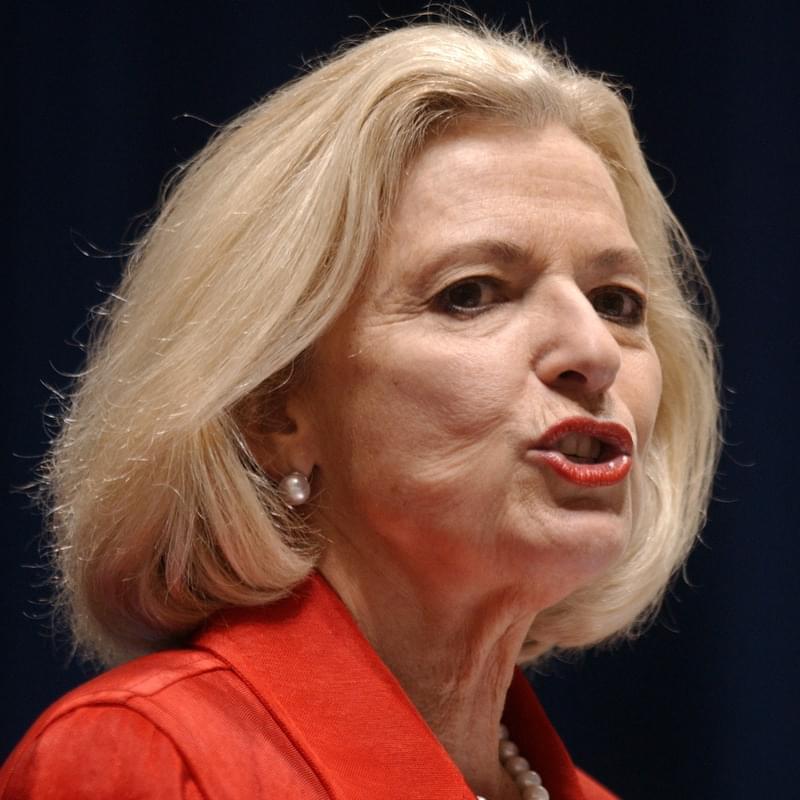
Anne Burke speaks at the national Voice of the Faithful convention in Indianapolis on July 9, 2005.
Court rules established by the Supreme Court set up a system in which judges and justices must disqualify themselves if they feel their impartiality could be questioned. Judges also must disqualify themselves if their spouses have what the rules describe as an "economic interest" in litigants before the court.
The phrase "economic interest" is defined as an ownership stake or an active leadership role — including that as an "advisor" — in a party before the court. It generally is not interpreted to extend to a client relationship, some legal experts said.
"I don't think Justice Burke would be required to disqualify herself in cases where Klafter & Burke represent a client in an unrelated matter," said Steven Lubet, a Northwestern University law professor. "The disqualification rules apply in circumstances where a judge's spouse has a financial interest. A law firm doesn't have a financial interest in unrelated litigation so those rules would not apply."
"There would be no reason to think a justice would be other than impartial because her husband's law firm is involved in some unrelated litigation," Lubet said.
But other legal experts say the Burkes' situation highlights the inadequacy of Illinois' judicial ethics safeguards.
Chicago Inspector General Joseph Ferguson is a former federal prosecutor who now watchdogs waste, fraud and abuse for all of City Hall. While he steered clear of specifically addressing Justice Burke's conduct, Ferguson questioned whether the court's rules are adequate.
The current system where judges themselves decide whether they have a conflict and then aren't compelled to explain their thinking creates "a windowless room" where the public can't see in, he said.
"Where we shouldn't be is where there's a question of whether there's a problem, and that's where we are right now," Ferguson said. "It's too opaque. It's too vague. It's too discretionary. It's too nontransparent and therefore nonaccountable for us to do anything but raise the question."
"The institution as a whole really has to question whether or not their standards and transparency are sufficient to overcome the questions that almost inevitably are going to arise in a situation like this," he said.
Family: "It doesn't seem like you're getting a fair shake"
Both Sloan and Zielinski said they never were interested in winning some kind of payday from the utility but instead wanted to be a priority whenever the power goes out because they said it could mean the difference between life and death for their son.
It's been eight years since their lawsuit was decided, but only after talking to WBEZ did they learn about the dots that connect the justice, her husband and his one-time client they were suing. It's a discovery that turned Sloan angry and tearful.
"Everybody is connected," she said. "It doesn't seem like you're getting a fair shake. You're not getting a fair trial."
Eugene Zielinski, who is a retired Chicago cop, and his wife said a justice with the high legal esteem of Anne Burke should have spotted a conflict of interest right away and stepped away from their case.
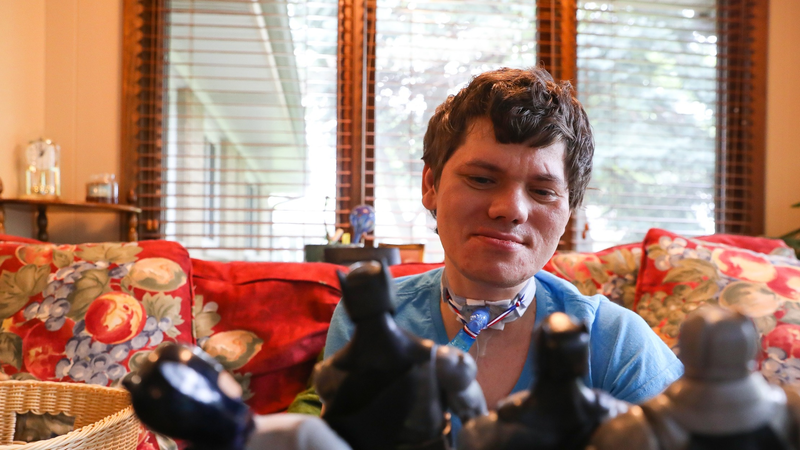
Jason Sloan at his Des Plaines home. Sloan, 42, has a rare disease that leaves him without the impulse to breathe.
WBEZ interviewed Zielinski and his wife at their home's living room table, while their son's ventilator noisily puffed bursts of air into his lungs as he slept on a nearby sofa. A plastic tub of his superhero figures sat nearby.
Given the ties Burke's husband had to ComEd, "I don't think her or anybody can walk in and preside over a case and look at it with truthful, innocent eyes," Sloan said. "I don't see that."
Editor's note: In the interest of full disclosure, ComEd is an underwriting sponsor for WBEZ. The alderman also listed WBEZ as a Klafter & Burke client in 2006 on his city financial disclosure statement.
Dave McKinney covers state politics and government for WBEZ. Follow him on Twitter at @davemckinney.

